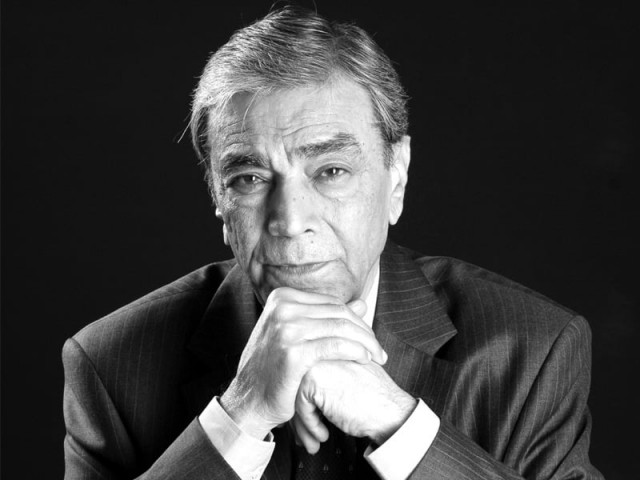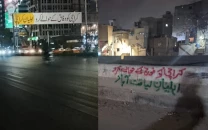Celebrating Zia Mohyeddin
An enlightening conversation with the maestro on revitalising theatre.

An enlightening conversation with the maestro on revitalising theatre.
Even with five decades of experience as an artiste, the cerebral Zia Mohyeddin does not allow himself to be lulled into a sense of complacency. In an interview with The Express Tribune, the gracefully aged maestro of performing arts confesses his own need for introspection and his life-long yearning for more thought-provoking theatre.
“This is not a case of false modesty, but I have never rated my work that high,” says master orator Mohyeddin, who is also chairman of the National Academy of Performing Arts (Napa). “I don’t like my work and am probably exceedingly self-critical.”
Seated behind a desk in his Napa office, the intellectual apologises for the use of Urdu phrases in an interview that is being conducted in English. In parlance that leaves one mesmerised to a point of speechlessness, he says the gap between intention and execution in theatre productions worries him most.
“There have been times where myself or others have felt that I have given a memorable performance. But I have always wondered what made it so marvellous?” He smiles and continues, “Well, if it was the lunch that I did not eat that day, then I tried not having lunch the very next day… but the performance was dismal.”
Zia Mohyeddin was one of the lucky ones who attended the drama school Royal Academy of Dramatic Arts (Rada) – one of the most prestigious institutions in the world for the study of theatre. He worked as an actor in the United Kingdom for 47 years and also produced some timeless programming for PTV before engaging himself with training theatre artists, something that he always wanted to do.
He talks about the idea behind the establishment of Napa and its theatre company, saying that he yearned for more thought-provoking theatre and wanted to inculcate an attitude of professionalism towards the art form. “I am not against comedy,” he says. “I am not against farce and I am not even against what I call the ‘theatre of vulgarity’. But there should be some thought-provoking theatre,” he stresses.
“By thought-provoking, I mean plays that depict the human condition to some extent, sublimate you and make you think as a member of the audience.”
Professionalism in theatre remains to be the biggest concern for Mohyeddin; he strongly believes that if a dipsomaniac is a true professional, he will not indulge before the performance but do as he pleases after the show. Sadly, he says, this is not the case in Pakistan and is something he wants to change through formal education.
“In Pakistan, if someone is playing a drunkard, he feels it’s a necessity to drink before the performance even if the role doesn’t demand it – just so he can get his act together. Drinking is not the real problem the core issue is the lack of professionalism,” he says.
This year is a special one for Mohyeddin, as he is presenting Waiting for Godot, the first English production of Napa. Directed by Mohyeddin himself, the Samuel Beckett play revolves around two characters who are waiting for the elusive Godot. “For me, Godot represents hope. I want to suggest that it is hope that keeps mankind going. Without hope, you can’t go on and you finally give up.”
He adds, “In our culture, when a man retires from his job all he does is sit home, remember God and do nothing else. You have to go on doing whatever it is you are capable of, regardless of any salvation or damnation.” With its last show today (Sunday), Waiting for Godot has become the centre of all attraction at Napa. Ironically, only one actor in the play is a Napa alumni as most graduates from the academy cannot communicate in English.
“I certainly don’t wish to start teaching in English,” he says. “Why would I do that when it is not a part of our culture, especially when majority of the students here do not belong to ‘Burger Land’.”
He explains that students are mostly from the lower middle class “who cannot even speak properly in Urdu”. “Sometimes their Urdu is so bad that I wonder what they have learnt in school. So the first step is to teach them how to read and speak in Urdu because what they consider talking in Urdu is not the way it is supposed to be spoken,” he says, with concern apparent in his tone.
A recent personal milestone for Mohyeddin is the stage debut of his 11-year-old daughter Aaliya Mohyeddin, who stars in Waiting for Godot. Almost 70 years ago, Mohyeddin himself made his stage debut at a similar age by playing the Greek god Dionysus in an original play written by his father, the late Khadim Mohyeddin. Though excited about her inclusion, he clarifies that her casting is not a result of nepotism but a need of the character.
“I am a hard-bitten professional. So much so, that I don’t let my family – my wives, regardless of which wife it is – near my work. All I say is, ‘No ma’am, please get aside; this is my professional work’.”
Published in The Express Tribune, December 8th, 2013.


















COMMENTS
Comments are moderated and generally will be posted if they are on-topic and not abusive.
For more information, please see our Comments FAQ